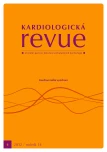Cardiorenal syndrome – from a nephrologist’s point of view
Authors:
B. Řepová; O. Viklický
Published in:
Kardiol Rev Int Med 2012, 14(4): 237-239
Category:
Overview
Cardiorenal syndrome is a term used to describe a very close relationship between heart and kidneys. Underlying pathophysiological mechanisms are still not fully understood and are still a subject of discussion. Cardiorenal syndrome classification system was proposed recently and divides cardiorenal syndrome into five groups. Cardiorenal syndrome has gained much attention from both cardiologists and nephrologists because of its association with significant morbidity and mortality. Many patients with heart failure have certain stage of renal dysfunction, and it was shown that the stage of renal dysfunction is a predictor of adverse prognosis as ejection fraction. On the other hand, patients with renal failure – when compared with healthy subjects – are significantly more likely to suffer from cardiovascular diseases. In this paper we explore the epidemiology and classification of cardiorenal syndrome, and then describe different pathophysiological mechanisms leading to the development of cardiorenal syndrome and eventually we focus on the therapeutic strategy.
Keywords:
cardiorenal syndrome – heart failure – renal insufficiency
Sources
1. Heywood JT. The cardiorenal syndrome: lessons from the ADHERE database and treatment options. Heart Fail Rev 2004; 9 : 195–201.
2. Geisberg C, Butler J. Addressing the challenges of cardiorenal syndrome. Cleve Clin J Med 2006; 73 : 485–491.
3. Adams KF Jr, Fonarow GC, Emerman CL et al. Characteristics and outcomes of patients hospitalised for heart failure in the United States: rationale, design and preliminary observations from the first 100,000 cases in the Acute Decompensated Heart Failure National Registry (ADHERE). Am Heart J 2005; 149 : 209–216.
4. McAlister FA, Ezekowitz J, Tonelli M et al. Renal insufficiency and heart failure: prognostic and therapeutic implications from a prospective cohort study. Circulation 2004; 109 : 1004–1009.
5. Forman DE, Butler J, Wang Y et al. Incidence, predictors at admission, and impact of worsening renal function among patients hospitalized with heart failure. J Am Coll Cardiol 2004; 43 : 61–67.
6. Tonelli M, Wiebe N, Culleton B et al. Chronic kidney disease and mortality risk: a systematic review. J Am Soc Nephrol 2006; 17 : 2034–2047.
7. Herzog CA, Ma JZ, Collins AJ. Poor long-term survival after acute myocardial infarction among patients on long-term dialysis. N Engl J Med 1998; 339 : 799–805.
8. Wali RK, Wang GS, Gottlieb SS et al. Effect of kidney transplantation on left ventricular systolic dysfunction and congestive heart failure in patients with end-stage renal disease. J Am Coll Cardiol 2005; 45 : 1051–1060.
9. Ronco C, Haapio M, House AA et al. Cardiorenal syndrome. J Am Coll Cardiol 2008; 52 : 1527–1539.
10. Cannon PJ. The kidney in heart failure. N Engl J Med 1977; 296 : 26–32.
11. Weinfeld MS, Chertow GM, Stevenson LW. Aggravated renal dysfunction during intensive therapy for advanced chronic heart failure. Am Heart J 1999; 138 : 285–290.
12. Bock JS, Gottlieb SS. Cardiorenal syndrome: new perspectives. Circulation 2010; 121 : 2592–2600.
13. Hill MF, Singal PK. Antioxidant and oxidative stress changes during heart failure subsequent to myocardial infarction in rats. Am J Pathol 1996; 148 : 291–300.
14. Krum H, Schlaich M, Whitbourn R et al. Catheter-based renal sympathetic denervation for resistant hypertension: a multicentre safety and proof-of-principle cohort study. Lancet 2009; 373 : 1275–1281.
15. Bradley SE, Bradley GP. The effect of increased intra-abdominal pressure on renal function in man. J Clin Invest 1947; 26 : 1010–1022.
16. Drazner MH, Rame JE, Stevenson LW et al. Prognostic importance of elevated jugular venous pressure and a third heart sound in patients with heart failure. N Engl J Med 2001; 345 : 574–581.
17. Gotloib L, Silverberg D, Fudin R et al. Iron deficiency is a common cause of anemia in chronic kidney disease and can often be corrected with intravenous iron. J Nephrol 2006; 19 : 161–167.
18. Anker SD, Comin Colet J, Filippatos G et al. Ferric carboxymaltose in patients with heart failure and iron deficiency. N Engl J Med 2009; 361 : 2436–2448.
19. Burger D, Lei M, Geoghegan-Morphet N et al. Erythropoietin protects cardiomyocytes from apoptosis via up-regulation of endothelial nitric oxide synthase. Cardiovasc Res 2006; 72 : 51–59.
20. Drüeke TB, Locatelli F, Clyne N et al. Normalization of haemoglobin level in patients with chronic kidney disease and anaemia. N Engl J Med 2006; 355 : 2071–2084.
21. Pfeffer MA, Burdmann EA, Chen CY et al. A trial of darbepoetin alfa in type 2 diabetes and chronic kidney disease. N Engl J Med 2009; 361 : 2019–2032.
22. Shlipak MG. Pharmacotherapy for heart failure in patients with renal insufficiency. Ann Intern Med 2003; 138 : 917–924.
23. Ungar A, Fumagalli S, Marini M et al. Renal, but not systemic, hemodynamic effects of dopamine are influenced by the severity of congestive heart failure. Crit Care Med 2004; 32 : 1125–1129.
Labels
Paediatric cardiology Internal medicine Cardiac surgery CardiologyArticle was published in
Cardiology Review

2012 Issue 4
-
All articles in this issue
- Cardiorenal syndrome – from a nephrologist’s point of view
- Cardiorenal syndrome in patients with acute heart failure
- Cardiorenal syndrome with chronic heart failure – from a cardiologist‘s point of view
- Acute kidney failure and cardiovascular complication
- Chronic renal failure and cardiovascular events
- Candesartan in the treatment of hypertension and heart failure
- Stenosis of the left main coronary artery due to compression by a dilated pulmonary artery
- Twiddler’s syndrome – an unusual cause of oversensing leading to inadequate implantable-cardioverter discharges
- Affect statin myopathy reduced form of coenzyme Q10?
- Pathophysiology of cardiorenal syndrome
- Cardiology Review
- Journal archive
- Current issue
- About the journal
Most read in this issue
- Cardiorenal syndrome – from a nephrologist’s point of view
- Affect statin myopathy reduced form of coenzyme Q10?
- Cardiorenal syndrome with chronic heart failure – from a cardiologist‘s point of view
- Acute kidney failure and cardiovascular complication
